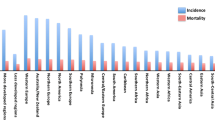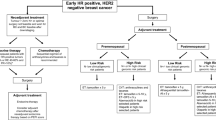Abstract
Many biologic prognostic markers are available for patientswith breast cancer, and considerable interest has beendevoted to confirm preliminary evidence of their roleas indicators of treatment response. It remains tobe assessed whether such markers are predictors ofresponse only to first-line or also to successivetherapies. Proliferative activity, defined by the3H-thymidine labelingindex (TLI), was determined on the primary lesionfrom 76 patients at time of first diagnosis.At relapse, patients underwent chemotherapy as absolute (48cases) or relative (28 cases) first-line treatment, andtheir clinical response was analyzed in relation tothe TLI of the primary lesion. The objectiveclinical response was significantly higher for rapidly (47%;CL, 33–61%) than for slowly proliferating tumors (15%;CL, 1–29%). These findings held true also whenadjusted for metastatic site, previous treatment, chemotherapy regimenadministered, and hormone receptor status. However, the directrelation between cell proliferation and benefit from chemotherapyheld true only when such a treatment wasused as an absolute first-line approach. Cell proliferationof primary lesions represents a consistent indicator ofresponse to chemotherapy over time. Previously administered regimens,at least hormone therapy, could alter the proliferation-relatedchemosensitivity profile of individual tumors.
Similar content being viewed by others
References
Holmes FA, Walters RS, Theriault RL, et al: Phase II trial of taxol, an active drug in metastatic breast cancer. J Natl Cancer Inst 83: 1797–1805, 1991
Neidhart JA: Hematopoietic colony-stimulating factors. Cancer 70: 913–920, 1992
Dogliotti L, Berruti A, Burriva T, Zola P, Barí MG, Farris A, Sarobba MG, Bottini A, Alquati P, Deltetto F, Gosso P, Manzeglio C, Moro G, Sussio M, Perroni D: A randomized comparison of high dose epirubicin versus high dose epirubicin plus lonidamine in advanced breast cancer patients. First results from a cooperative group study. Int J Oncol 4: 741–746, 1994
Clark GM: Do we really need prognostic factors for breast cancer? Breast Cancer Res Treat 30: 117–126, 1994
Osborne CK: Receptors. In: Harris JR, Hellman S, Henderson JC, Kinne DW (eds), Breast Disease. Lippincott, Philadelphia, pp. 301–305, 1991
Meyer JS, Lee JY: Relationships of S-phase fraction of breast carcinoma in relapse to duration of remission, estrogen receptor content, therapeutic responsiveness, and duration of survival. Cancer Res 40: 1890–1896, 1980
Paradiso A, Tommasi S, Mangia A, Lorusso V, Simone G, De Lena M: Tumor proliferative activity, progesterone receptor status, estrogen receptor level and clinical outcome of estrogen receptor-positive advanced breast cancer. Cancer Res 50: 2958–2962, 1990
Nicholson RI, Bouzubar N, Walker KJ, et al.: Hormone sensitivity in breast cancer: influence of heterogeneity of estrogen receptor expression and cell proliferation. Eur J Cancer 7: 908–913, 1991
Silvestrini R, Daidone MG, Mastore M, et al.: Cell kinetics as a predictive factor in node-positive breast cancer treated with adjuvant hormone therapy. J Clin Oncol 11: 1150–1155, 1993
Sulkes A, Livingston RR, Murphy WK: Tritiated thymidine labeling index and response in human breast cancer. J Natl Cancer Inst 62: 513–515, 1979
Remvikos Y, Beuzeboc P, Zajdela A, Voillemot N, Magdelenat H, Pouillart P: Correlation of pretreatment proliferative activity of breast cancer with the response to cytotoxic chemotherapy. J Natl Cancer Inst 81: 1383–1387, 1989
Bonadonna G, Valagussa P, Tancini G, et al.: Current status of Milan adjuvant chemotherapy trials for node-positive and node-negative breast cancers. NCI Monogr. 1: 45–49, 1986
O'Reilly SM, Camplejohn RS, Millis RR, Rubens RD, Richards MA: Proliferative activity, histological grade and benefit from adjuvant chemotherapy in node-positive breast cancer. Eur J Cancer 26: 1035–1038, 1990
Daidone MG, Silvestrini R, Canova S, Valagussa P, Bonadonna G: Tumor cell kinetics and course of node-positive breast cancer. Proc ASCO 8: 24, 1989
Muss H, Thor A, Kute T, et al.: erbB-2 (c-erbB-2: HER-2/neu) and S-phase fraction predict response to adjuvant chemotherapy in patients with node-positive breast cancer: Cancer and Acute Leukemia Group B Trial 8869. Proc ASCO 12: 72, 1993
Amadori D, Volpi A, Callea A, Amaducci L, Morgagni S, Magni E, Nanni O: Clinical relevance of cell kinetics in breast cancer. Ann NY Acad Sci 698: 186–192, 1994
Silvestrini R, and the SICCAB Group for Quality Control of Cell Kinetic Determination: Feasibility and reproducibility of the 3H-thymidine labeling index in breast cancer. Cell Prolif 24: 437–445, 1991
Amadori D, Bonaguri C, Nanni O, et al.: Cell kinetics and hormonal features in relation to pathological stage in breast cancer. Breast Cancer Res Treat 18: 19–25, 1991
McGuire WL, Clark GM: Prognostic factors and treatment decisions in node-negative breast cancer. N Engl J Med 326: 1756–1761, 1992
Early breast cancer trialists collaborative group: Systemic treatment of early breast cancer by hormonal, cytotoxic or immune therapy. Lancet 339: 1–15, 1992
Skipper HE: Kinetic behavior versus response to chemotherapy. NCI Monogr 34: 2–14, 1971
Teixeira C, Reed JC, Prati MAC: Estrogen promotes chemotherapeutic drug resistance by a mechanism involving Bcl-2 proto-oncogene expression in human breast cancer cells. Cancer Res 55: 3902–3907, 1995.
Author information
Authors and Affiliations
Rights and permissions
About this article
Cite this article
Amadori, D., Volpi, A., Maltoni, R. et al. Cell proliferation as a predictor of response to chemotherapy in metastatic breast cancer: A prospective study. Breast Cancer Res Treat 43, 7–14 (1997). https://doi.org/10.1023/A:1005780107879
Issue Date:
DOI: https://doi.org/10.1023/A:1005780107879




